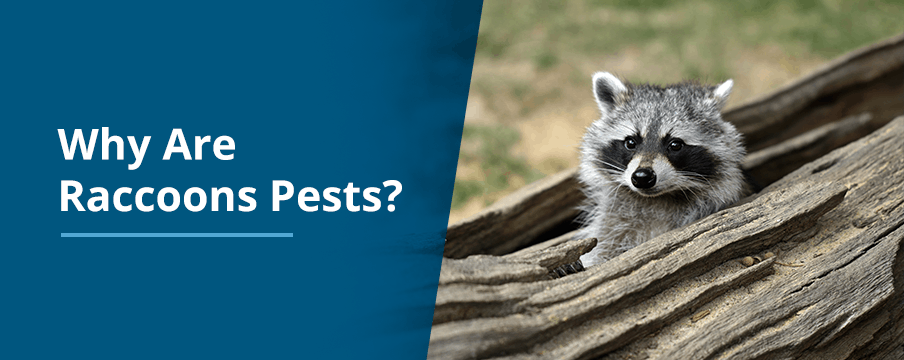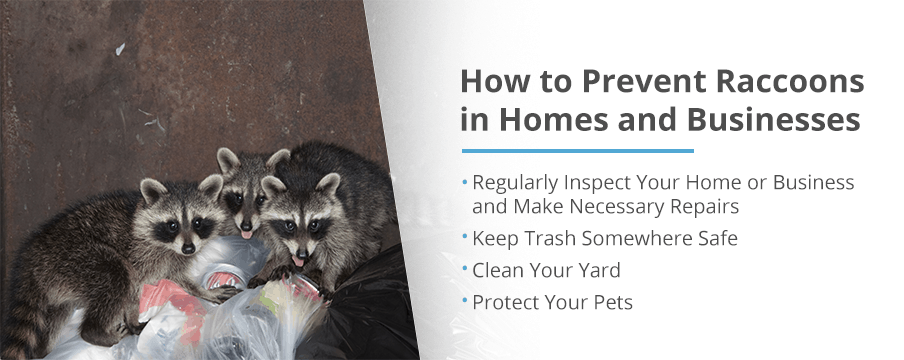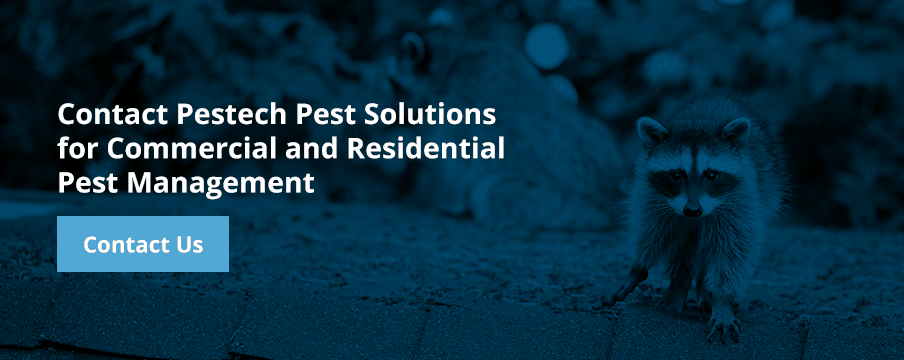Why Are Raccoons Pests?

Have you ever heard rustling or rummaging near your trash at night? From Canada, through the U.S. and down to South America, the North American raccoon — the most common raccoon — has made its home.
Raccoons are known to be highly intelligent mammals and are incredibly adaptive. These creatures have a black mask across their eyes, five to ten black bands ringed around their tail and shaggy, coarse fur. Raccoons are nocturnal, searching for anything to eat after the sun goes down. However, raccoons do more than steal trash from your trash can and have the potential to be very pesky critters.
Short Answer: Why Are Raccoons Considered Pests?
Pests = animals or insects known to cause problems, including damage or destruction, for people.
Just what makes raccoons pests? In addition to creating a mess of your garbage can and scattering trash about, raccoons can ruin gardens and crops and are also known to make a home in buildings’ roofs, damaging your home or your business’s insulation, shingles, electrical wiring and more.
How Are Raccoons Dangerous?
When people think of raccoons, they likely don’t consider them to be highly dangerous animals. Although they are nocturnal, it’s not rare for raccoons to make an appearance during the day.
It is rare, however, for raccoons to show unprovoked aggression toward people.
While some female raccoons may defend their babies, it’s highly unlikely for raccoons to chase someone. If a raccoon is exhibiting hostile behavior for no apparent reason, it is likely diseased. Since raccoons are known to carry various types of diseases, they potentially pose severe dangers to other animals and even humans.
Rabies is one of the primary diseases raccoons are known to carry. Although the Center for Disease Control and Prevention reports that only one person has died from the raccoon rabies strain, rabies is still a very serious disease that can affect all mammals and attack the central nervous system.
Plus, there’s currently no successful form of medical treatment for humans infected with rabies. Since raccoon populations are growing in the eastern part of the U.S., so is the rabies disease.
In New York State, for example, raccoons had more rabies cases than any other wildlife species since around 1990. It’s essential to recognize the signs to prevent coming in close contact with a raccoon infected with rabies.
Here are some indicators of an infected raccoon:
- Hobbling/difficulty walking
- Leg paralysis
- Confusion and disorientation
- Unaware of nearby movement or noise
- Tangled, wet hair on the face
- Wandering around erratically
- Significant aggression
- Self-mutilation
- Unusual, loud high-pitched sounds
- Discharge from the mouth and eyes
Raccoons also carry roundworm, found in raccoon feces. Roundworm can affect other animals and humans, so it’s crucial to keep an eye on children and pets outside to ensure they don’t get in contact with infected feces.
If you notice an area near your home or business building up in raccoon excrements, make sure you clean it up correctly so you don’t come in contact with any potential disease. Since raccoons can also make a home in your attic or crawl space, check these areas to ensure they are raccoon-free and, thus, disease-free.
Leptospirosis is a bacterial disease spread by raccoons through infected urine or contaminated soil and water. Animals or humans infected with leptospirosis may experience many different symptoms or no symptoms at all.
If left untreated, leptospirosis can cause kidney damage, liver failure, meningitis, respiratory distress or even death. Because of the various diseases raccoons may transmit, they pose a danger to other animals and people alike.
Why Raccoons Are Hard to Get Rid Of
Raccoons are so hard to get rid of because they are smart, extremely adaptable and fast-growing in population.
Did you know that a raccoon’s brain is the same size as a cat’s, but it has as many neurons as a dog’s? Given the size of their brains to neurons, raccoons are able to process closer to the rate of primates.
Aside from strong brain function, Raccoons are equipped with sensory receptors on their paws — four times the amount than what’s in their feet. This allows them to feel different textures easily to better understand their surroundings.
Raccoons are also omnivores- they eat both plants and animals- meaning that they will eat just about anything and rely on trash cans for a quick late-night bite.
To our last point, raccoons reproduce at an aggressive rate. Female raccoons typically produce a litter per year- and they can live up to 12 years.
Because of all of these factors, raccoons are very tough to get rid of. Rural cities are at the highest risk for raccoon infestations. Cities like Toronto have tried everything from catching and releasing the wildlife pests, to equipping the entire city with “raccoon-proof trash cans;” but haven’t had great luck yet in ridding the rural area of them.
How to Prevent Raccoons in Homes and Businesses

Instead of removing raccoons after they become a problem, you can also take some precautionary measures to prevent raccoons from taking over your home or business. Here are a few tips on how to keep these masked bandits out so you can continue living in harmony with one another:
1. Regularly Inspect Your Home or Business and Make Necessary Repairs
Since raccoons can gain entry to your home or business through holes, uncapped chimneys, busted vents or any other roof openings, it’s vital to keep an eye on things so you notice if something is out of the ordinary. If you find any visible signs of raccoons or even loose siding or shingles, make the repairs necessary to keep everything in great condition to keep raccoons out.
2. Keep Trash Somewhere Safe
If raccoons are a big problem in your area, consider keeping your trash sealed and locked in somewhere such as a shed. You may even want to secure the garbage can lid with cinder blocks or bungee cords as an extra preventative measure since raccoons are very smart.
3. Clean Your Yard
Any branches, leaves or other debris could act as an ideal hiding spot or living area for raccoons, so make sure you mow your grass and clean up your yard regularly to avoid anything piling up. Keep firewood at least 20 feet or so from the building in winter as raccoons may use it to build a shelter. You should also remove things like bird feeders and fruit or produce from gardens.
4. Protect Your Pets
Make sure your pets are up to date with their rabies vaccinations and seal any pet entry doors in the evening to prevent raccoon entry.
Contact Pestech Pest Solutions for Commercial and Residential Raccoon Management

If your home or business has a raccoon problem, contact Pestech Pest Solutions to help.
Pestech has been family-owned and operated for 30 years, serving New York State residents to resolve their pest problems on their time.
Whether you have raccoons in your business or your home, your health and safety are our top priorities.
With more than 20 years of experience dealing specifically with nuisance wildlife, our trained and licensed Pestechnologists know the best trapping and exclusionary methods to keep raccoons out.
Our catch rates prove it — they are the highest in the Tri-State and Hudson Valley regions. We also offer a 100% satisfaction guarantee to ensure continued service for no additional charge if we can’t solve the problem the first time. Contact us today to see what we can do for your home or business.
